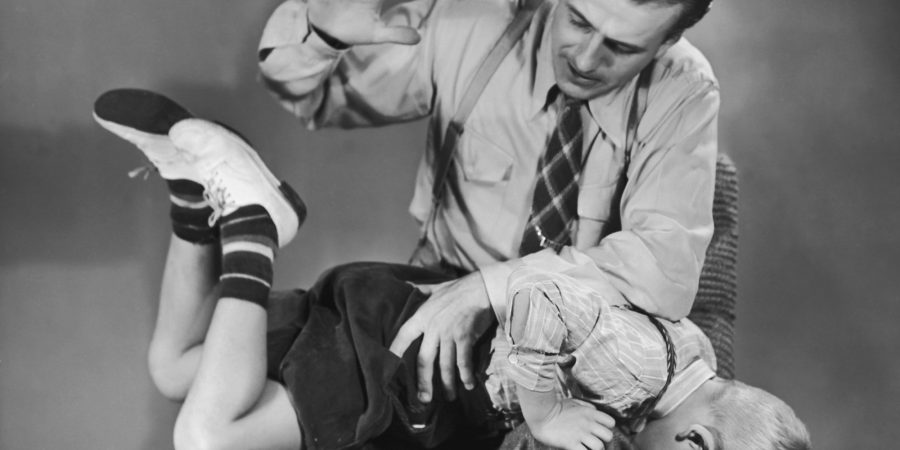“Not hitting your kid is like not feeding them; neglect!” Well, according to my mother anyway.
This past summer, the National Football League was rocked by a number of scandals, including the child abuse charges filed against Minnesota Vikings running back Adrian Peterson, who allegedly spanked his toddler son until he had bruises and welts along his back, legs, and buttocks. This incident only served to add fuel to an already heatedly debated topic: Is physical punishment an acceptable way to discipline children?
Psychological research would say no. According to Mr Kimball, who teaches IB Psychology at TAS, “anytime you physically punish a child until they are hurt, that sends a very powerful negative and psychological message to them that they carry for the rest of their life…ultimately, it shows [the child] that you as a parent, someone who is supposed to love them and care for them, are unable to find a more effective way to discipline them, and for a lot of children that’s very confusing and damaging.”
Our generation exists in a unique position where our parents are rather evenly divided on the issue of hitting their kids. Even more polarizing is the fact that that the majority of us hail from a mixture of Eastern-Western culture, which take opposite stands on the issue. In Western culture, the general consensus is that hitting your kids is wrong. Hit your child in a Californian mall and you’ll earn disapproving glares from other mothers. In Eastern culture…well you saw what my mom said.
While some of us grew up under the cane (and coat hanger…and rolling pin….and umbrella), others have grown up in households where violence was forbidden on all grounds. Some students, like Kimberlie Y. (12), Cynthia P. (12), and Sumin C. (12), were never hit as children. “I was actually more scared of talking it out than of getting hit,” Sumin recalls, “because talking it out meant I had to think about what I had done.”
“[My siblings and I] were never hit, and we were pretty well behaved kids“, Kimberlie said. She makes a point to highlight the fact that that she and her siblings were well behaved because they were never hit, not despite it.
Other students vividly recall the pain of punishment. “My parents made me kneel for 30 minutes in front of a wall once,” recalls Harrison H. (12). It seems most of the students who had experienced physical punishment believe that it’s beneficial. “I thank my parents every day for hitting me as a kid…I think I would’ve turned out worse if they didn’t,” Johann W. (11) believes.
However, he points out that his parents didn’t rely solely on corporal punishment: “My parents would always talk to me first. And then if I made the same mistake a second time, they would hit me. Talking was an important part of it.” In saying so, Johann raises an important point regarding physical punishment. As with anything else, there are many ways to discipline children, and not all forms of physical punishment should be written off as abuse.
“If it’s used sparingly and lightly, as a quick rebuke that’s used alongside talking, and the child understands why it’s happening, then obviously that’s different from giving the child a beating,” Mr. Kimball acknowledges.
And so the great debate continues, both here at TAS and everywhere else in the world. Does sparing the cane spoil the child? Or does it just protect him from a lifetime of psychological and emotional trauma? It’s become increasingly clear the answer will not be as simple as “yes” or “no”.
Hitting your kids: Yay or Nay?
October 15, 2014
0
More to Discover


![Sofia Valadao [Erin Wu/The Blue&Gold]
Erin Wu [Annabelle Hsu/The Blue&Gold]](https://blueandgoldonline.org/wp-content/uploads/2025/05/erin-sofia-pic.png)
![Dr. Simeondis, Mr. Anderson. [Annabelle Hsu/The Blue&Gold]](https://blueandgoldonline.org/wp-content/uploads/2025/05/teachers-1200x675.jpg)
![[PHOTO COURTESY OF UNCULTURED, JUNIPER AND CO.]](https://blueandgoldonline.org/wp-content/uploads/2025/05/student-businesses-1200x675.png)
![Photo of the girl's varsity badminton team [PHOTO COURTESY OF TAS ATHLETICS]](https://blueandgoldonline.org/wp-content/uploads/2025/05/BadmintonTeam-04839-1200x675.jpg)
![The Institute for Speech and Debate, now based all across the east coast of the US. [PHOTO COURTESY OF MR. WILLIAMS]
Mr. Morris' various ceramic artwork. [PHOTO COURTESY OF MR. MORRIS]](https://blueandgoldonline.org/wp-content/uploads/2025/05/Untitled-design-1-1200x918.png)
![Mr. Castro celebrates at the finish line. [PHOTO COURTESY OF MR. CASTRO]](https://blueandgoldonline.org/wp-content/uploads/2025/04/20240513_092650124_iOS-e1745300337344-1200x1116.jpeg)